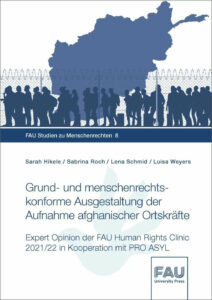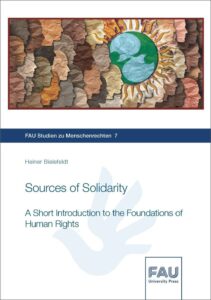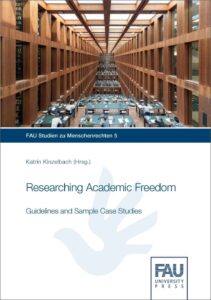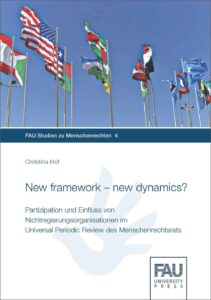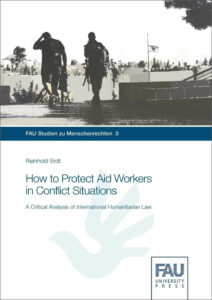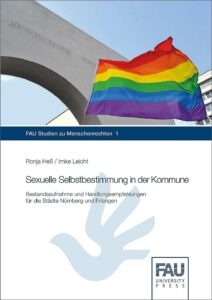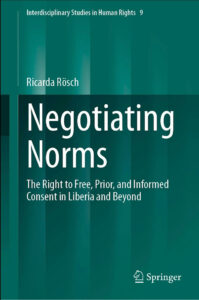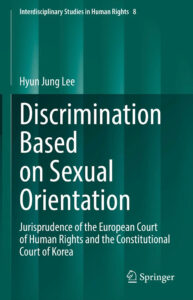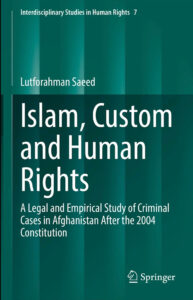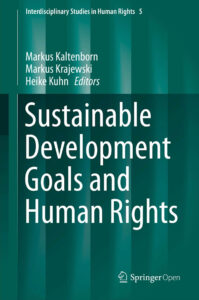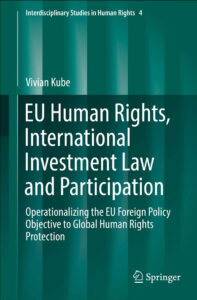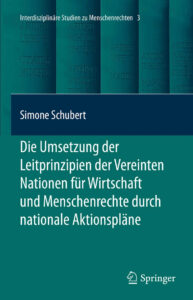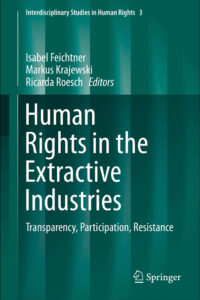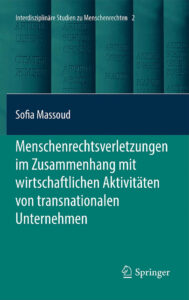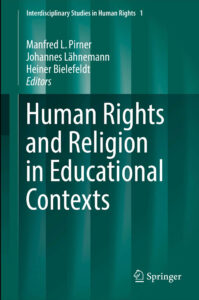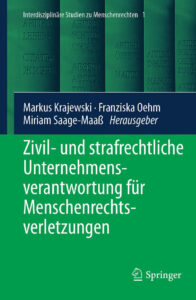FAU Studien
FAU Studies for Human Rights
The FAU Studies for Human Rights, published by the Centre for Human Rights, are available via FAU Open Access.
Grund- und menschenrechtskonforme Ausgestaltung der Aufnahme afghanischer Ortskräfte – Expert Opinion der FAU Human Rights Clinic 2021 / 2022 in Kooperation mit PRO ASYL
Hikele, Sarah; Roch, Sabrina; Schmid, Lena; Weyers, Luisa
The pictures of the abrupt withdrawal of international troops from Afghanistan in the summer of 2021 travelled around the world. With the fall of Kabul on 15 August 2021, the country fell back under Taliban rule. Only a fraction of the local forces working for the Bundeswehr or other German organisations were evacuated. Thousands of local forces are still trapped in Afghanistan and are threatened and persecuted by the Taliban as collaborators. This study is the result of the FAU Human Rights Clinic 2021/22, during which students of the Friedrich-Alexander-Universität Erlangen-Nürnberg, in cooperation with PRO ASYL, dealt with the human rights issues of the reception of local forces. In the course of the research, interviews were conducted with lawyers, staff from human rights organisations and affected local workers. The study documents the events in the summer of 2021, elaborates on the problems of the so-called local staff procedure (Ortskräfteverfahren) and makes proposals for a human rights-compliant interpretation of section 22 sentence 2 of the Residence Act (AufenthG) and the introduction of new protection instruments.
Sources of Solidarity – A Short introduction to the Foundations of Human Rights
Bielefeldt, Heiner
Human rights are not just another set of legal tools, norms and entitlements. Rather, they radiate the authority of „inalienable rights“, which all human beings equally possess – simply because of their humanness. This is the foundational idea.
Although human rights are a beacon of hope for numerous people in all continents, they remain politically contested in many ways. Critics have questioned the effectiveness of human rights campaigns as well as the legitimacy of promoting universal rights across political and cultural boundaries. In order to respond to critical objections, one has to tackle stereotypical misperceptions, such as the false equation of human rights with an „individualistic“ lifestyle. In fact, human rights facilitate political solidarity based on universal respect. Unlike other introductions to human rights, which usually focus on legal standards, procedures and institutions, this book mainly explores the foundational principles, which jointly define the human rights approach: inherent dignity, freedom, equality and solidarity. The purpose is to trigger curiosity, critical questions, debates and personal discoveries.
Professor Heiner Bielefeldt teaches human rights at the Friedrich-Alexander University in Erlangen-Nurembourg. Between 2010 and 2016, he served as UN Special Rapporteur on freedom of religion or belief.
Rechtsgutachten und Entwurf für ein Gesetz zur Umsetzung menschenrechtlicher und umweltbezogener Sorgfaltspflichten
Kieninger, Eva-Maria; Krajewski, Markus; Wohltmann, Franziska
The legal opinion and the draft law on the implementation of human rights and environmental due diligence were prepared on behalf of Bündins 90/Die Grünen parliamentary group of June 2021. This version of the study has been slightly revised and updated following the adoption of the Act on Corporate Due Diligence in Supply Chains in 2021. The publication of this study illustrates what alternative options would have existed for the design of a due diligece law and serves as a suggestion for future legislation.
Researching Academic Freedom
Kinzelbach, Katrin
International human rights law protects the freedom indispensable for scientific research – a prerequisite for innovation and the pursuit of knowledge. However, empirical research on the protection and violation of academic freedom remains scarce. This volume seeks to fill that gap by introducing case study guidelines as well as four sample case studies in which the authors applied these guidelines in their research on academic freedom in Brazil, Egypt, Ireland, and Russia. The book also includes an inventory of available data sources on academic freedom, providing guidance on how to utilize and contextualize these data in country-level assessments. The research guidelines and case studies presented here are the result of an international, collaborative endeavor. Collectively, the authors seek to promote systematic, comparable research on academic freedom, while also fostering a community of scholars committed to developing this nascent field of interdisciplinary human rights research.
New framework new dynamics? Partizipation und Einfluss von Nichtregierungsorganisationen im Universal Periodic Review des Menschenrechtsrats
Hof, Christina
Together with the establishment of the Human Rights Council by the United Nations General Assembly in 2006 a new mechanism was created with the aim of regularly scrutinizing the human rights situation in all UN member states. Despite the great potential of the so-called Universal Periodic Review (UPR) to strengthen human rights protection globally scholars raised considerable doubts whether the UPR would live up to the high expectations. This is one of the main reasons why nongovernmental organizations (NGOs) were seen as key actors for the new review mechanism. By participating in the review process NGOs were expected to alleviate the obvious weaknesses of the UPR and enhance its effectiveness.
Using methods of qualitative research the dissertation generates knowledge about the role NGOs play in the UPR. Specifically, it examines how NGOs make use of the mechanism to raise their concerns and sheds light on the extent to which NGOs can influence the review process. The dissertation concludes by discussing the overall impact of NGO engagement on the mechanism itself. The exploratory research draws on an in-depth case study of the Federal Republic of Germany and offers some generalizable conclusions for the situation in other countries.
How to Protect Aid Workers in Conflict Situations : A Critical Analysis of International Humanitarian Law
Erdt, Reinhold
The deteriorating security situation for aid workers remains one of the vital but overlooked issues in humanitarian aid. Despite advancements in ensuring respect for International Humanitarian Law, violations of its rules remain a widespread problem. The increase in attacks against aid workers in recent years once again raises questions concerning the scope of their protection and ways to improve it. One principal reason behind this negative trend has been the shift in the nature of conflicts and the role of the “war on terror” in undermining the laws authority. Other reasons stem from internal developments of humanitarian actors, namely a lack of transparency or the cooptation of aid. This results in increased politicization and the disintegration of the civilian nature of humanitarian assistance.
There is a need to reassess the role IHL can play in keeping aid workers safe. With non-State armed groups at the center of contemporary conflicts, engaging them is not longer only an option, but becomes a necessity. Traditionally, studies have focused on why actors violate International Humanitarian Law rather than on what encourages them to respect it. Relying only on sanctions has proven to be rather ineffective. With a focus on the incentive structure of International Humanitarian Law, the author will analyze the reoccurring violations from a different angle in order to understand the rationale inducing armed groups to respect it, and to propose viable approaches for the future. There now is a development towards a customary international rule that can curtail a State’s scope of action in treating non-State armed groups. The accumulation of customary law relating to non-international armed conflict, the convergence of International Humanitarian Law applicable in international armed conflict and non-international armed conflict, the protection awarded by International Human Rights Law and the practice of amnesties suggest that the extension of combatant status and Prisoners of War privileges should be possible.
Analyzing these developments, the author proposes the application of International Humanitarian Law without making a distinction as to the source of obligation to all parties involved in a conflict, as a promising way to achieve greater adherence to International Humanitarian Law and thus a solution to keep aid workers safe.
Staatliche Schutzpflichten und unternehmerische Verantwortung für Menschenrechte in globalen Lieferketten.
Krajewski, Markus
The responsibility of transnational corporations for human rights violations in global supply chains continue to be of public interest: Fires in textile factories in Pakistan, environmental destructions due to oil production or worst forms of child labour in mines which produce minerals for electronic goods are just a few examples. Even if companies are not formally bound to internationally binding human rights according to current legal doctrine, a number of legal and political instruments emerged recently through which companies can be held accountable. The contributions to this volume analyse recent developments in public international law and domestic torts law and provide fresh insights into the fundamental questions of corporate responsibility for human rights violations in global supply chains.
Sexuelle Selbstbestimmung in der Kommune. Bestandsaufnahme und Handlungsempfehlungen für die Städte Nürnberg und Erlangen
Heß, Ronja; Leicht, Imke
The cities of Nuremberg and Erlangen are committed to further promote sexual and gender diversity as an integral part of their municipal anti-discrimination and diversity policies. This study presents the results of a qualitative survey on how sexual orientation and gender identity (SOGI) as dimensions of diversity have been taken into account in selected areas. Subsequently, recommendations are presented on how SOGI could be gradually established as a cross-sectional theme in relevant municipal areas of responsibility. For this purpose, the study draws on the human right of sexual self-determination. It focuses on the meaning and role of the municipality and puts SOGI into an intersectional context.
Interdisciplinary Studies
Interdisciplinary Studies in Human Rights
Human rights are one of the normative cornerstones of contemporary international law and global governance. Due to the complexities of actual or potential violations of human rights and in light of current crises, new and interdisciplinary research is urgently needed. The series Interdisciplinary Studies in Human Rights recognizes the growing importance and necessity of interdisciplinary research in human rights. The series consists of monographs and collected volumes addressing human rights research from different disciplinary and interdisciplinary perspectives, including but not limited to philosophy, law, political science, education, and medical ethics. Its goal is to explore new and contested questions such as the extraterritorial application of human rights and their relevance for non-state actors, as well as the philosophical and theoretical foundations of human rights. The series also addresses policy questions of current interest including the human rights of migrants and refugees, LGBTI rights, and bioethics, as well as business and human rights.
Negotiating Norms – The Right to Free, Prior, and Informed Consent in Liberia and Beyond
Rösch, Ricarda
The book explores the right to free, prior and informed consent (FPIC) – a highly controversial right. It is mainly discussed in the context of large-scale business projects on Indigenous territories but also with respect to the creation of protected areas and communities’ traditional resource rights. From a legal anthropological perspective, it attempts to disentangle the various coexisting understandings of FPIC and provide an explanation for the multiplicity of FPIC norms or – to put it in other words – its fragmentation. It examines the right- or stakeholders of FPIC, the scope of the consent requirement, the respect for self-determined decision-making, and the right to FPIC of women in different sociolegal fields. Moreover, it explores the impact of power relations, strategic alliances, and discourses within these fields and shows that the emerging FPIC norms are the result of norm negotiation processes.
The fields that are examined include transnational law – more specifically, human rights, environmental, and development law -, the Liberian post-conflict forest and land legislation, and Liberian community forests as fields in which FPIC is operationalized. Liberia is quite unique in this respect. It is not only one of the few countries in Africa recognizing FPIC but has also begun implementing it. The book shows that based on the logic of a sociolegal field, legal identities are discursively created and determine the meaning of FPIC. Moreover, different actors can resort to different legalities shaping the emerging FPIC norm.
Discrimination Based on Sexual Orientation – Jurisprudence of the European Court of Human Rights and the Constitutional Court of Korea
Hyun Jung, Lee
The book discusses discrimination based on sexual orientation in the jurisprudence of the European Court of Human Rights (ECtHR) and the Constitutional Court of Korea. The work provides insights into how prohibition on discrimination based on sexual orientation can be realized in South Korea with the reference of the case law of other jurisdictions including mainly from the ECtHR. The book reviews related principles and methodological tools applied in the jurisprudence of the ECtHR. Considering that the rights of sexual minorities are evolving in many jurisdictions including Europe, and this problem is currently of great importance in the constitutional and political discussion, the topic is important to the readers in Europe as well as in Korea.
Islam, Custom and Human Rights – A Legal and Empirical Study of Criminal Cases in Afghanistan After the 2004 Constitution
Lutforahman, Saeed
For the first time, the author has explored the intertwinement of written law, Islamic law, and customary law in the highly complex Afghan society, being deeply influenced by traditional cultural and religious convictions. Given these facts, the author explores how to bridge the exigencies of a human rights–driven penal law and conflicting social norms and understandings by using the rich tradition of Islamic law and its possible openness for contemporary rule of law standards. This work is based on ample field research in connection with a thorough analysis of the normative contexts. It is a landmark, since it offers broadly acceptable and thus feasible solutions for the Afghan legal practice. The book is of equal interest for scientists and practitioners interested in legal, religious, social, and political developments concerning human rights and regional traditions in the MENA region, in Afghanistan in particular.
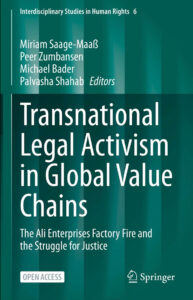
Transnational Legal Activism in Global Value Chains – The Ali Enterprises Factory Fire and the Struggle for Justice
Saage-Maaß, Miriam; Zumbansen, Peer; Bader, Michael; Shahab, Palvasha
This open access book documents and analyses the various interventions – legal, political, and even artistic – that followed the Ali Enterprises factory fire in Karachi, Pakistan, in 2012. It illuminates the different substantive and procedural aspects of the legal proceedings and negotiations between the various local and transnational actors implicated in the Ali Enterprises fire, as well as the legal and policy reforms sparked by the incident. This endeavour serves to embed these legal cases and reform efforts in the larger context of human and labour rights protection and global value chain governance. It also offers a concrete case study relevant for ongoing debates around the role of transnational approaches in making human rights litigation, advocacy, and law reform more effective. In this regard, the book interrogates and critically reflects on such legal campaigns and local and transnational reform work with a view to future transformative legal and social activism.
Sustainable Development Goals and Human Rights
Kaltenborn, Markus; Krajewski, Markus; Kuhn, Heike
This open access book analyses the interplay of sustainable development and human rights from different perspectives including fight against poverty, health, gender equality, working conditions, climate change and the role of private actors. Each aspect is addressed from a more human rights-focused angle and a development-policy angle. This allows comparisons between the different approaches but also seeks to close gaps which would remain if only one perspective would be at the center of the discussions.
Specifically, the book shows the strong connections between human rights and the objectives of the 2030 Agenda for Sustainable Development and the Sustainable Development Goals adopted by the United Nations in 2015. Already the preamble of this document explicitly states that “the 17 Sustainable Development Goals … seek to realise the human rights of all”. Moreover, several goals and targets of the 2030 Agenda correspond to already existing individual human rights obligations. The contributions of this volume therefore also address how the implementation of human rights and SDGs can reinforce each other, but also point to critical shortcomings of the different approaches.
EU Human Rights, International Investment Law and Participation – Operationalizing the EU Foreign Policy Objective to Global Human Rights Protection
Kube, Vivian
This book demonstrates how human rights obligations of the EU foreign constitution can be operationalized in the realm of international economic regulation. The content is divided into three major parts. The first outlines the legal foundations needed for the EU to become a shaper of international investment law, which include the general principles and objectives of EU external policies, the Charter of Fundamental Rights, international human rights and the international investment competences of the EU. The second part demonstrates the current international investment regime’s incompatibility with human rights interests, while the third analyzes two mechanisms stemming from trade Law – ex-ante human rights impact assessments and civil society monitoring bodies – and explores whether they could mitigate the current inequalities in the protection of rights. The potential of these mechanisms, the book argues, lies in their capacity to ensure a comprehensive assessment of all interests at stake, and to empower traditionally marginalized rights-holders to make, shape and contest the international investment regime.
Die Umsetzung der Leitprinzipien der Vereinten Nationen für Wirtschaft und Menschenrechte durch nationale Aktionspläne
Schubert, Simone
This book is dedicated to the general question of how international guidelines are implemented in the national sphere and also examines the concrete implementation of the UN Guiding Principles through national action plans. The concept of “soft implementation law” is developed and the role of soft law in implementation law is demonstrated.
Another topic of the book is national action plans as instruments for the implementation of international guidelines. As part of the examination of the implementation processes of the UN Guiding Principles, the German, Danish and British action plans are analysed and compared. The various implementation processes are evaluated and categorised in legal terms.
(Only available in German.)
Human Rights in the Extractive Industries – Transparency, Participation, Resistance
Feichtner, Isabel; Krajewski, Markus; Roesch, Ricarda
This book addresses key challenges and conflicts arising in extractive industries (mining, oil drilling) concerning the human rights of workers, their families, local communities and other stakeholders. Further, it analyses various instruments that have sought to mitigate human rights violations by defining transparency-related obligations and participation rights. These include the Extractive Industries Transparency Initiative (EITI), disclosure requirements, and free, prior and informed consent (FPIC). The book critically assesses these instruments, demonstrating that, in some cases, they produce unwanted effects. Furthermore, it highlights the importance of resistance to extractive industry projects as a response to human rights violations, and discusses how transparency, participation and resistance are interconnected.
Menschenrechtsverletzungen im Zusammenhang mit wirtschaftlichen Aktivitäten von transnationalen Unternehmen
Massoud, Sofia
This book analyses whether and how transnational corporations can be effectively obliged to respect fundamental human rights through legal obligations. It also reflects on the socio-political perspectives of possible strategies. The book addresses all types of human rights. However, the subject of the study is deliberately limited to the core labour standards of the ILO. The work takes into account both companies affiliated under company law and the possibility of regulation to protect against human rights violations in connection with the economic activities of companies in global supply chains.
The book analyses strategies under private and international law. On the basis of selected approaches, the author comes to the conclusion that there is no legal necessity for the current state of inadequate protection against human rights violations in connection with the economic activities of companies. According to the author, deficits in the discussion also lie in the fact that there is a regular lack of reflection on the opportunities and possibilities of implementing necessary legal policy strategies.
(Only available in German.)
Human Rights and Religion in Educational Contextes
Bielefeldt, Heiner; Länemann, Johannes; Pirner, L. Manfred
What is the role of religion(s) in a human rights culture and in human rights education? How do human rights and religion relate in the context of public education? And what can religious education at public schools contribute to human rights education?
These are the core questions addressed by this book. Stimulating deliberations, illuminating analyses and promising conceptual perspectives are offered by renowned experts from ten countries and diverse academic disciplines.
Zivil- und strafrechtliche Unternehmensverantwortung für Menschenrechtsverletzungen
Krajewski, Markus; Oehm, Franziska; Saage-Maaß, Miriam
This volume contains analyses of the civil and criminal law consequences of corporate action in the event of human rights violations. The focus is on German civil, commercial and private international law as well as German and international criminal law. This is supplemented by analyses of English and US liability law. The articles in this volume summarise the current state of research and discussion and highlight both legal policy options and the need for further research. The issues discussed and analysed in this volume are both a starting point and a frame of reference for a better understanding and further development of the relationship between business and human rights.
(Only available in German.)
Zeitschrift für Menschenrechte
Zeitschrift für Menschenrechte – zfmr
The zfmr is an interdisciplinary journal on human rights and human rights policy. It analyses and reflects on current and systematic human rights issues from the perspective of political science, history and law as well as philosophy, sociology and education.
The journal is edited by Prof Dr Michael Krennerich (Academic Director FAU CHREN) and others. You can access the zfmr here.

